Amriya Issa Yahya
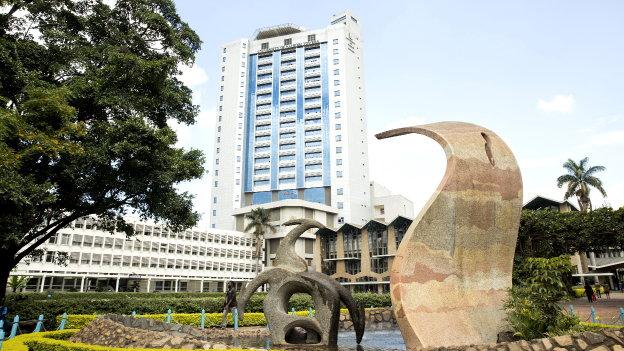 DAAD
DAAD
The University of Nairobi
"As I transition into the next phase of my academic and professional journey, I am excited to apply the knowledge, skills, and experiences I gained during my studies. I remain committed to lifelong learning and continuous improvement, and I am eager to contribute positively to the field. I am passionate about pursuing further studies on policy development and strategic management. It has been an enriching and transformative experience, and I am grateful for the opportunities afforded to me."
The Garissa Master Scholarship Kenya has not only opened the door to an academic education for Amriya Issa Yahya, but also offered her the opportunity to grow and learn in the midst of global challenges such as the Covid-19 pandemic.
She describes her the challenges with online learning, that were pretty much the same in Kenya as in the rest of the world, and other moments during her sur place scholaship period:
The study program commenced on 4th October 2021 and classes were conducted online due to the global Covid-19 pandemic and the government containment measures inhibiting physical learning. To accommodate the new way of learning, the university transitioned to online learning platforms such as Zoom, Google Meet, Microsoft Teams, and a learning management system like the e-classroom as well as an e-library where a vast amount of resourceful materials was obtained.
To adapt to the changes, I faced quite a number of challenges during my formative period of study. Initially, I joined the classes using my smartphone and was forced to either hang-up an incoming call from my phone or leave an online class to receive a call. This really affected my concentration levels during classes. A month later, I bought a laptop which helped to alleviate these issues, helped me prepare my individual as well as group assignment presentation as per our lecturer’s demands during online classes.
Furthermore, I faced challenges of maintaining focus during classes especially when some students were not muting their audio during classes but as classes were progressing, the lecturer would warn students to mute when joining and during classes or leave the class till the next lesson.
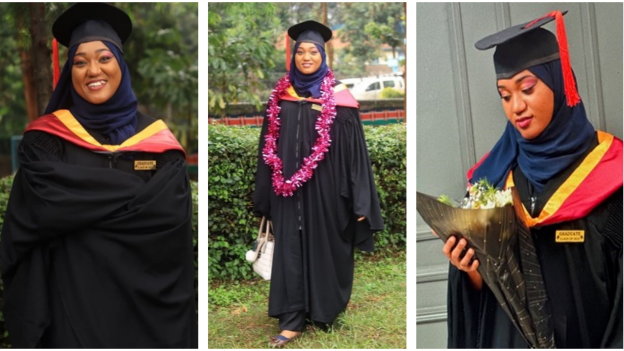
Privat
A successful graduation: A proud moment
Moreover, the university ICT department trained us on how the online sessions and online examinations will be conducted, and further provided handouts and guidelines on how to access Students Management Information System (SMIS) as well as e-class platforms. The MBA (Master of Business Administration) program enabled me to gain self-confidence and the ability to understand as well as evaluate business experiences from academic and practical perspectives while becoming aware of the ever-changing local and international business environment.
My lecturers and academic supervisor, Mr. Moses Machuki, were very accommodative and would always respond effectively and efficiently whenever an academic issue was raised. For instance, prior to presentation of my project thesis, Mr. Moses and I would meet to have an in-depth analysis and prepare for thesis presentation before presenting it to the panel. I vividly remember the day I was presenting my project proposal. It was on rainy morning of 2nd July 2023 when I approached the thesis panel for the first time to defend my project proposal. That day, we were 10 students who were defending our proposals and due to time constraints, we were given strict instructions that the proposal presentation be allotted 10 minutes per students and thereafter the panel would ask questions with regards to the proposal.
The first five students’ presentations did not fit the criteria of the thesis panel hence the students were told to prepare well and present their proposal at a later date to be communicated by the university. I was the 6th student to approach the panel, I was nervous and in panic mode when I faced the panel, I did not utter a word for like 5 minutes until the chairperson of the panel told me that I have 1 minute to compose myself or else the treatment will be similar as my previous fellow students. This made me more anxious, and Mr. Moses interjected and requested the panel to give me more time to exit the room and compose myself. Luckily after the 9th student presentation I was allowed to present my proposal successful and thereafter granted the permission to proceed to data collection of my research study.
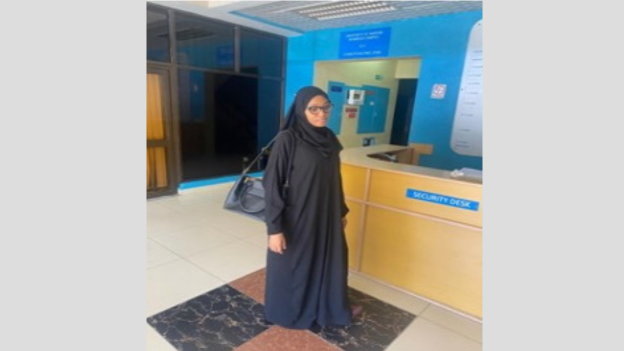
Privat
The place where it all began: The entrance to the university
There was an average of three-hour online classes weekly from the beginning of October 2021 to the beginning of January 2022 for each course unit, and the final examinations were conducted from 17th January to 29th January 2022. At the onset of the third semester, from mid-February 2022 to the beginning of May 2022, the university confirmed that blended classes would be administered (online and physical), and the continuous assessment tests and final examinations were administered physically at the end of the semester from 9th May 2022 to 21st May 2022.
Furthermore, the university was working towards a smooth transition to full capacity learning as the government vaccination exercise continued country wide. At first, most students were not happy on the onset of physical classes and examinations due to the laxity of attending online classes while having the opportunity to do other non – academic activities simultaneously e.g. login an online class while doing household chores or attending an online class while in another country.
The fourth semester commenced on 10th October 2022 to 16th January 2023 with an average of three-hour classes (physical). A physical examination was thereafter took place from 23rd January 2023 to 4th February 2023.Due to the Covid-19 pandemic, most of my studies were conducted online especially between October 2021 to January 2022 hence I would spend most of my study time browsing at the university e-library portal for various academic materials, journals and articles.
Sometimes I would visit the university library section which was very much accessible for students who would wish to access physical study materials. For instance, books such as Exploring Strategy published by Johnson G., Whittington R, Scholes K.,Angwin D., & Reigner P (2017), 11th edition and The Management of Technology and Innovation: A Strategic Approach published by White M.A and Brutan G.D (2007), first edition were some of the books that really helped me conceptualize the realm of Strategic Management.
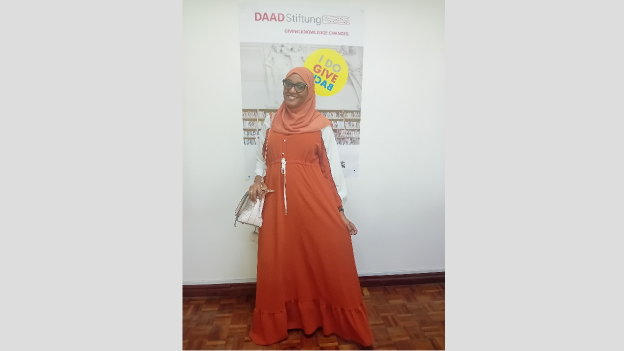
Privat
The DAAD-Stiftung supports academic education
As the pandemic ushered in online studies it was initially challenging especially when there were power blackouts, slow internet bandwidth, and some of the students not muting their gadgets during online classes, thus interrupting classes.
On week 6 of learning, I was to sit for my continuous assessment tests (CATs) on the e-class portal and was not allowed because the e-class was linked to the Student Management Information System (SMIS) where tuition fees were being paid. However, the DAAD patiently and collaboratively communicated, which seamlessly enable me to explain to the university management that fee payments are underway, thus allowing me to sit for the test in good time.
Challenges further escalate when the continuous assessment tests and final examinations were administered online through the e-class portal and the invigilator would always announce that the web camera should be on at all times during examinations. I remember some students would complain on our class WhatsApp group chat, that they could not complete their examination due to blackouts or internet issues. I was very careful to ensure that the same would not happen to me. Therefore, I always ensured that I had sufficient data bundles and prayed that I successfully completed my tests and final exams without experiencing any power surge or blackout.
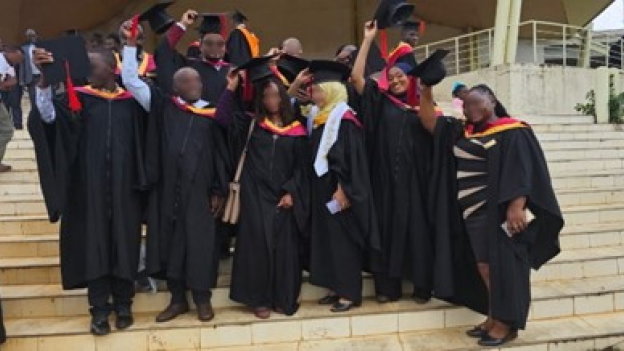
Privat
Big smile on graduation day
However, the university was very proactive in dealing with such issues and the lecturers would always record the online classes and submit the recordings to google class in good time. Moreover, we were always advised to have the invigilator’s contact number before the onset of the examination and continuous assessment tests and inform them in case of any blackouts or any other issue during examinations.
On Friday, 15th December 2023, at the university graduation square, I successfully graduated my master’s degree in business administration (Majoring in Strategic Management).
On 8th September 2022, we agreed as DAAD-Stiftung family under the Garissa Master Scholarship decided to visit the DAAD office in Nairobi to show gratitude and appreciation to DAAD-Stiftung and DAAD for granting us the golden opportunity to further our studies. DAAD-Stiftung and DAAD had made me affirm that the power of education will never be silenced, even by the sound and sight of the deadliest gun.
After completion of my academic course work, I embarked on exploring research opportunities and extracurricular activities such as the annual research week, which focused on harnessing research to foster resilience and sustainability in communities, thereby broadening my skill set and enhancing my overall learning experience. I intensified my focus on thesis research and project completion under the supervision of my academic supervisor.
My research topic was to investigate innovative strategies and performance of Savings and Credit Co-operative Societies Organizations (SACCOs) in Kenya.
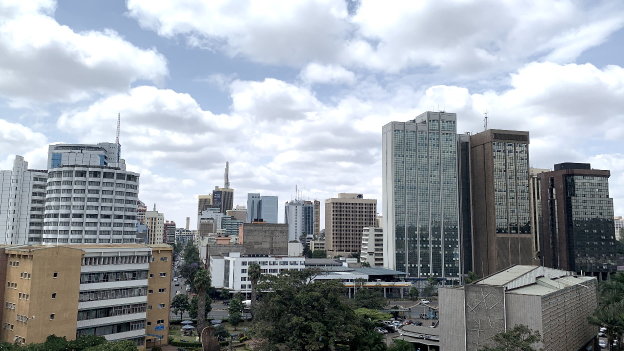
DAAD
The skyline of Nairobi
By leveraging the knowledge and skills acquired over the study period, I delved deeper into my chosen area of specialization, conducted extensive literature reviews, and collected data for analysis. Despite encountering challenges along the way, such as time constraints and methodological complexities, I remained resilient and sought guidance from my supervisor and mentors to overcome obstacles effectively.
The following are the highlights of my research works done during my study period. I completed the final draft of my thesis, incorporating feedback from my advisor and university project defense committee members. I presented my research findings at academic conferences, receiving positive feedback and valuable insights for future work such as exploring the role of leadership and organizational culture within the savings and credit cooperative organizations (SACCOs). By sharing my research work, policymakers, academicians, theorists, and practitioners within the SACCO sub – sector to make strategic decisions. For instance, the policymakers can develop regulatory frameworks that encourage and facilitate innovations within SACCOs.
The academicians can utilize the findings to further research the potential tradeoffs and synergies between different types of innovations so as to provide a more holistic understanding of innovation dynamics within cooperatives. Finally, the practitioners within SACCOs can leverage on the study findings to continuously monitor and evaluate the impact of their innovation strategies thus adapting to the ever-changing market conditions and technological advancements.
As I transition into the next phase of my academic and professional journey, I am excited to apply the knowledge, skills, and experiences gained during my studies. I remain committed to lifelong learning and continuous improvement, and I am eager to contribute positively to the field. For instance, I am passionate about pursuing further studies on policy development and strategic management. This area particularly helps in understanding the sources of a firm’s success and failure, as a prerequisite for policy development, improved performance and sustainable competitive advantage.
I would like to express my sincere gratitude to the entire DAAD-Stiftung/DAAD fraternity for their immense support, guidance, and encouragement throughout my academic endeavor. It has been an enriching and transformative experience, and I am grateful for the opportunities afforded to me.
As of May 2023.


